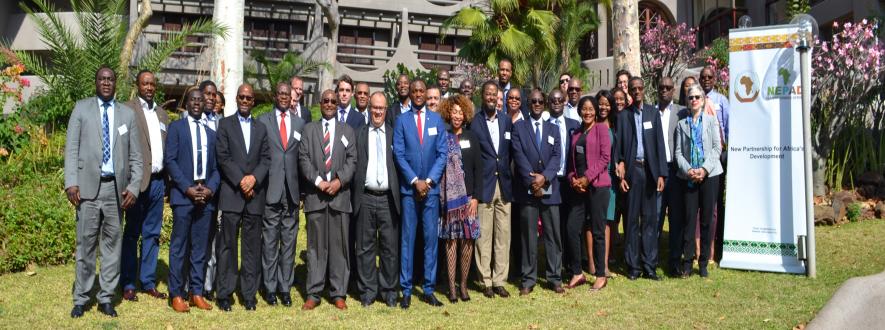At the end of June, the New Partnership for Africa’s Development (NEPAD) Agency, supported by the African Development Bank, the Regional Economic Communities, and other stakeholders met in Victoria Falls, Zimbabwe, with the objectives of crafting measures to accelerate infrastructure delivery, as well as enhance access to infrastructure financing through institutional investors and the private sector.
Global Water Partnership (GWP) Southern Africa’s Kidanemariam Jembere, technical advisor, and Remmy Makumbe, special advisor, participated in the meeting and took the opportunity to introduce the Africa Investment Programme (AIP), including the recent collaboration between NEPAD and GWP on Programme for Infrastructure Development in Africa (PIDA)-Water and the upcoming Training Workshop on Water Projects Preparation for GCF funding.
“We convened this dialogue mainly to define concrete policy recommendations for Africa’s leadership which can advance infrastructure projects implementation under the umbrella of the Programme for Infrastructure Development in Africa (PIDA),” said Symerre Grey-Johnson, head of Regional Integration, Infrastructure and Trade Programme, NEPAD.
Managing transboundary water resources is a major component of PIDA, and delivering transboundary infrastructure projects bear a large burden of success. These projects face a plethora of challenges, including an institutional lack of technical and financial capacity at late-stage preparation, which is recognized as one of the key bottlenecks in enabling regional infrastructure projects to reach financial close. The PIDA Service Delivery Mechanism (SDM) was developed and established by the African Union Commission and the NEPAD Agency as a specific instrument to address this challenge and to ensure that projects reach completion.
“The NEPAD SDM has been especially beneficial to the Zambezi River Authority, specifically on the Batoka Gorge Hydropower Project, which is at preparation stage now. We continue to work with the SDM for technical support which will help in attracting investors to fund the project,” said Munyaradzi Munodawafa, Zambezi River Authority CEO, demonstrating the effectiveness of the NEPAD and PIDA agenda.

Existing guarantee instruments that support Africa’s infrastructure are partial guarantee instruments with varying conditionality and complex requirements for qualification and access. The NEPAD meeting reviewed different modalities and options for setting up an African Guarantee Facility for PIDA Infrastructure projects to ensure projects secure funding and reach completion.
A key observation was that private sector funding for water was limited, and as such the need for guarantee in the sector was equally low. However, for the PIDA Water programme, the recommendation was to utilize the facilities set up for the rest of PIDA projects, and a separate AIP Guarantee facility could be explored.
The June meeting convened to review the financial potential of Pension and Sovereign Wealth Funds to invest into Africa’s Infrastructure and provide tools and policies to achieve such outcomes.
The NEPAD attendees agreed that there exists the potential for institutional investors to play an immense role in financing infrastructure development in Africa, with some estimates showing a US $108 billion per year deficit on the continent. Key to addressing the deficit, are the national and regional regulatory frameworks that control institutional investment in Africa, which need to be addressed. Proceedings from the June meeting make it clear that there have been some successes achieved in doing so, with more to come.
PIDA was endorsed at the African Union Assembly Heads of State level in February, 2012. PIDA and other tools are providing high level political mechanisms for infrastructure development in Africa.
As Water Canada reported in May, “there is an opportunity for Canada to take a leadership role based on its wealth of water expertise, history of successful governance, and community of water cleantech entrepreneurs” to develop partnerships that support water security across the globe.








